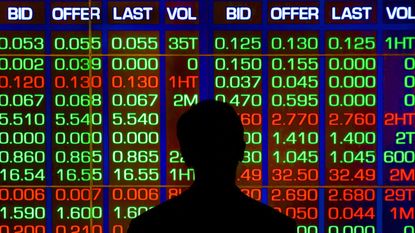Stocks reeled Monday as the war between Israel and Hamas caused oil prices to spike and added to anxieties about rising global bond yields and a potential interest rate hike at the next Fed meeting.
The major market benchmarks started the session solidly in the red after the worst surprise attack on Israeli soil in 50 years threw the region into chaos over the weekend. Oil prices spiked on worries that the violence could spread into a larger conflict that would disrupt energy supplies. Benchmark U.S. crude oil futures popped as much as 5.4% in early trades before cooling down, but still remained elevated on the day.
Ultimately, it was a day for safe havens, with the U.S. dollar and gold catching bids. Treasurys were unchanged as the bond market was closed for a U.S. holiday. The search for safe havens extended to the equity market, with sectors such as telecommunications stocks also helping to buoy the market. Blue chip dividend stocks such as Verizon (VZ) and AT&T (T) finishing solidly in the green.
Subscribe to Kiplinger’s Personal Finance Be a smarter, better informed investor.
Save up to 74%
Sign up for Kiplinger’s Free E-Newsletters Profit and prosper with the best of expert advice on investing, taxes, retirement, personal finance and more – straight to your e-mail.
Profit and prosper with the best of expert advice – straight to your e-mail.
At the closing bell, the Dow Jones Industrial Average added 0.6% to finish at 33,604, while the broader S&P 500 rose 0.6% to 4,335. The tech-heavy Nasdaq Composite gained 0.4% to close at 13,484.
The energy sector saves the dayThe massive increase in geopolitical uncertainty seemingly overnight had market participants scrambling to reassess their risk profiles heading toward the final quarter of the year. And although markets turned positive in mid-day trading, that was largely thanks to support from rising share prices in the energy sector.
Indeed, the energy sector of the S&P 500 gained 3.4% on the day, led by strength in Exxon Mobil (XOM), Dow Jones stock Chevron (CVX), EOG Resources (EOG) and Occidental Petroleum (OXY).
Market participants might also have found solace in the fact the historical record for equities in light of Middle East violence isn’t necessarily one of doom and gloom.
Jeffrey Kleintop, chief global investment strategist at Charles Schwab, notes that market reactions to such shocks in the past have typically been “muted.”
(Image credit: Charles Schwab)
Looking at 24 events dating back to the Avivim School Bus Massacre of 1970, Kleintop found that the average five-day price change for the S&P 500 following such events is -0.1%. When military operations are involved, the S&P 500 has gained an average of 1.5% on a price basis over the five days following the outbreak of violence.
Past results are no guarantee of future performance, Kleintop emphasizes, but history – and Monday’s eventual up day for stocks – suggest that the outbreak of war may have little impact on U.S. equity prices in the days and weeks ahead.
Related contentIs the Stock Market Closed on Columbus Day/Indigenous Peoples’ Day in 2023?Mortgage Demand Drops As Interest Rates ClimbWill Cannabis Be Impacted By Kevin McCarthy’s Ouster?: This Week in Cannabis Investing
